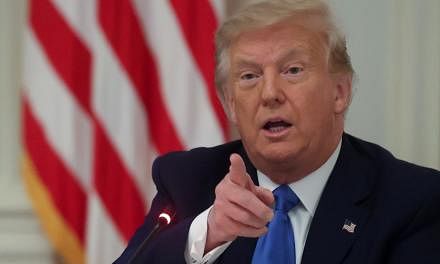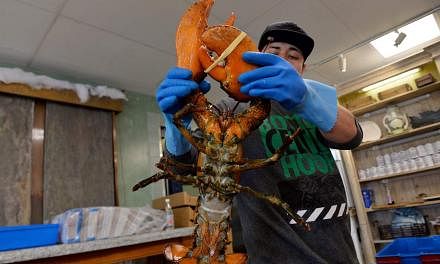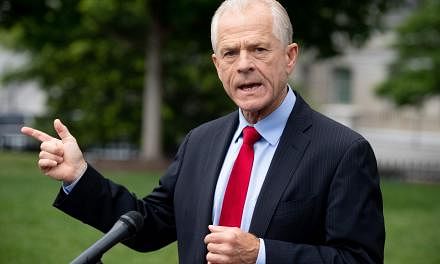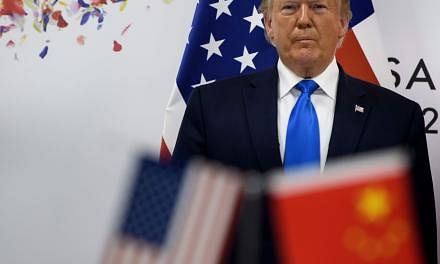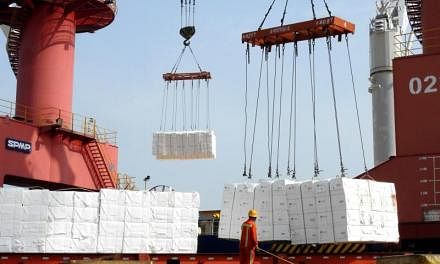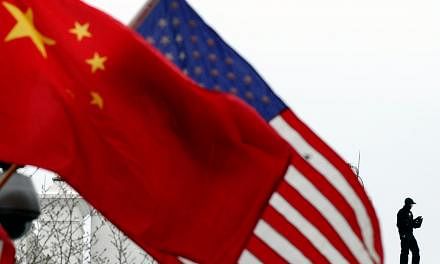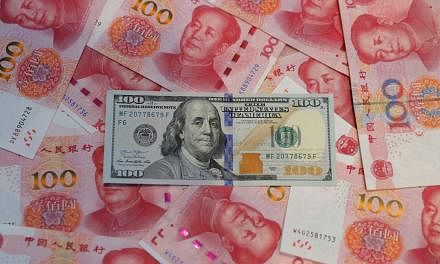WASHINGTON (NYTIMES) - The Trump administration has drafted an executive order that would increase inspections of mailed packages, in an effort to crack down on shipments of counterfeit goods and deadly drugs from foreign nations including China.
The order would empower the US Postal Service to increase inspections of small packages that arrive in the country by air, according to several people familiar with the draft, who declined to be named because they were not authorised to speak publicly.
That would help to close a loophole that has allowed dangerous drugs like the opioid fentanyl and other contraband to pass into the United States unchecked.
The measure is not aimed specifically at China. But it comes as talks between the US and China about a trade deal have stagnated and as President Donald Trump continues to accuse China of failing to stop shipments of fentanyl from entering the US.
Mr Trump said late last month that he was directing the Postal Service and private US companies like FedEx, Amazon and UPS to search packages from China for fentanyl and refuse delivery.
On Sept 1, Mr Trump slapped more tariffs on Chinese imports as punishment for Beijing's failure to stop fentanyl shipments and its refusal to buy more agricultural goods from the United States.
"Fentanyl kills 100,000 Americans a year. President Xi said this would stop - it didn't," Mr Trump said in a tweet last month, referring to Mr Xi Jinping, China's President.
The executive order would apply solely to the Postal Service, not private companies like FedEx or UPS. The order is drafted to apply to all countries, though the effects would fall most heavily on China, a major source of both counterfeit products and fentanyl as well as small packages shipped into the US.
Despite months of talks, negotiators still appear far from a comprehensive trade deal that would resolve the Trump administration's concerns about Chinese economic practices, including its infringement on US intellectual property.
The two sides were on the cusp of an agreement this spring, when Chinese leaders decided that some US demands to change their laws infringed too much on Chinese sovereignty.
Since then, Mr Trump has moved ahead with taxing an additional US$112 billion (S$154 billion) of Chinese products and is expected to raise tariffs even further in the coming weeks. China imposed additional tariffs on US$75 billion worth of US goods in retaliation.
Tensions between the two sides have eased slightly in recent weeks, with Chinese officials agreeing to travel to the US in October for the next round of talks.
On Wednesday (Sept 11), China published a short list of US products that would be exempt from its new tariffs and said it would announce more exemptions in coming weeks. The exemptions included cancer drugs and certain chemicals that China does not produce domestically, but it did not include US exports like pork and soybeans, which have been targeted by Beijing as punishment for Mr Trump's tariffs.
In remarks in the Oval Office Wednesday, Mr Trump greeted the exemptions as a sign that China would soon compromise, saying that the trade war "was only going to get worse" and "they want to make a deal".
"They took tariffs off, certain types," he said. "I think it was a gesture. It was a big move. People were shocked. I wasn't shocked."
Even so, China and the US appear to have made little progress on the substantive differences that have prevented them from signing an agreement. Chinese officials have emphasised recent changes they have made to laws governing foreign investment and intellectual property, rather than discussing the more substantial changes the Trump administration has demanded.
Mr Trump has ordered US companies out of China and expressed satisfaction at the damage his tariffs are wreaking on its economy.
Business leaders say they are already struggling under the tariffs, and predict lower profits and wage cuts if further levies go into place. A poll by the US Chamber of Commerce in Shanghai published Wednesday said the trade war was weighing on its members' projections for revenue growth, optimism about the future and future investment plans.
Moody's Analytics estimates that the trade war has already cost 300,000 US jobs, a toll that could increase to nearly 450,000 by the end of this year and nearly 900,000 jobs by the end of next year, assuming Mr Trump's planned tariff hikes go into effect.
In recent months, some of the focus has shifted away from the terms of the trade deal itself, where the US and China remain at a stalemate, to whether there can be an interim agreement that would involve Chinese purchases of US agricultural products and smooth over relations between the countries.
Chinese officials and their contacts have floated the idea of restarting agricultural purchases, in return for the US postponing further tariff increases and offering some relief for Huawei, the Chinese telecoms giant that has been blacklisted from purchasing US products, several people familiar with the matter said.
Mr Trump has been deeply frustrated by China's refusal to purchase US agricultural products in recent months. The move would help the president by buoying a constituency that is important for him politically and also increasingly opposed to the trade war.
But such an interim agreement has also proved elusive. The president and his advisers are increasingly aware of the national security risk posed by Huawei and cognisant that they would face criticism from Democrats and Republicans alike if they relent.
US officials may consider removing some tariffs in return for economic concessions from China, but they are unlikely to do so for agricultural purchases, Mr Trump's allies say.
The Chinese, meanwhile, know that agricultural purchases would reduce the political pressure on Mr Trump and potentially increase his chances of re-election, and they are not likely to trade away this source of leverage easily, people familiar with their thinking said.


